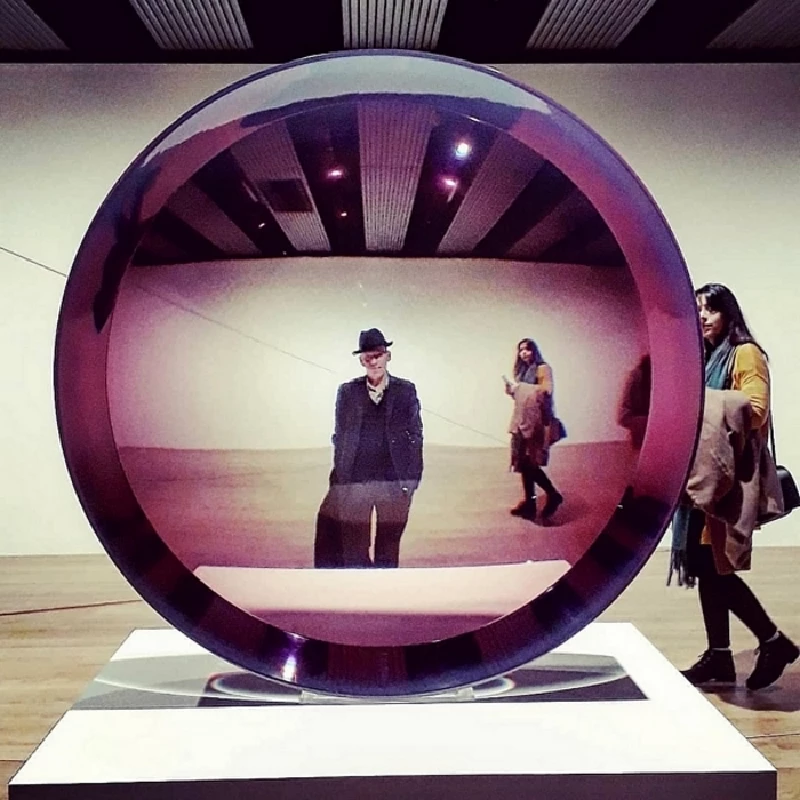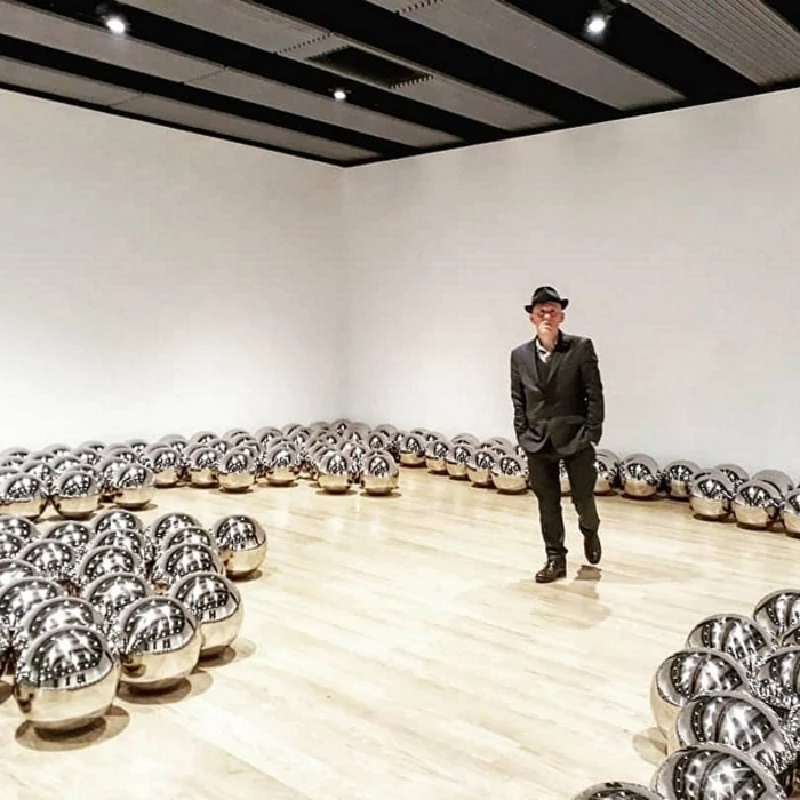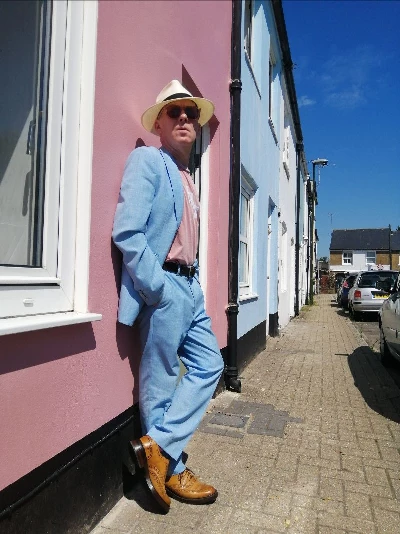Keiron Phelan - Interview
by Kimberly Bright
published: 4 / 2 / 2019

intro
Songwriter and composer Keiron Phelan talks to Kimberly Bright about his first solo album 'Peace Signs', as well as Chaucer's 'The Canterbury Tales', liturgical music, and accents.
Keiron Phelan is a prolific pop/rock/indie songwriter and neoclassical composer who has founded a plethora of projects, including State River Widening, Smile Down Upon Us, littlebow, and Silver Servants. His recent solo album 'Peace Signs' is his first release as a singer as well as songwriter and he looked to David Bowie's 'Hunky Dory' for his modus operandi. He spoke to Pennyblackmusic about this change of direction in his career and the surprisingly varied inspiration behind some of his new songs. PB: There are devastating emotional experiences in some of the songs on 'Peace Signs': being betrayed, left, abruptly ghosted, yet there's not a feeling of rancour in your lyrics or voice. You sound serene and mature and rather nice. Some sarcasm on 'Ain't She Grown', maybe. Why do you think this is? Are you more inclined to express heartbreak as sadness and disappointment rather than anger? Keiron Phelan: These are mostly character study songs so, while the feelings do come from me, I only have to inhabit those emotional spaces for the duration. Then I go back to being my sunny little self. I'm disgracefully untragic. Frankly, neither disappointment or anger are particularly useful emotions, albeit they gift fruitful writing material. Perhaps it's a matter of accumulating emotional experience over a number of decades? 'Peace Signs' (the song) is probably more personal to me but it's also about emotional perspective so I had to at least aim for maturity, there, even if it takes a dramatic form. There certainly is sarcasm on "Ain't She Grown" as the narrator is quite an unpleasant man, in self-pitying mode. I have to 'be' him, in the singing of it, but I can't completely hide my disdain. I'm glad I sound nice on the whole, though! Still, I always thought the Kinks' Ray Davies sounded like a really nice, easy guy. Not so, according to all sources, including himself. So, beware. PB: I didn't see John Wesley Harding mentioned as one of the singer-songwriters who influenced you in your 'DOA'interview, but I was reminded of him on 'Ain't She Grown'. Are you familiar with him? I also sensed a kinship between you and Robyn Hitchcock. KP: I'm only slightly aware of Harding's work, to be honest. I obviously need to become better acquainted. I can see the Hitchcock link, especially in a song like 'Satellite Hitori'. I think I share his English, slightly Barrett-esque, way of trying to reinvent the world so that it becomes a more sideways kind of place. I haven't kept track of his every twist and turn as he's quite prolific but my favourite Hitchcock song is 'Belltown Ramble', which is a remarkable trip. That's the only word for it. PB: What Laurel Canyon songs did you have in mind on 'Peace Signs'? KP: All and any of them. I was just delighted that we'd got to that quality level with the backing vocals. Almost totally due to Brona McVittie and Oliver Cherer who sorted that little corner of magnificence out. Done separately in their respective home studios, which one would never guess from how beautifully they knit together. PB: What about Bowie's 'Hunky Dory' did you aspire to emulate on the album? KP: Yes, that was quite a pretentious aspiration. I favour the Bowie albums where he's being more the song-writer and less the conceptualist which, to me, 'Hunky Dory' encapsulates. I wanted to be able to move through a series of musical styles and arrangements while keeping all of the songs (and their characters) in the same 'world'. Also to be able accommodate the acerbic feel of something like "Hippy Priest" alongside the optimism of 'Canterbury' and the lightness of 'Country Song' with the sadness of 'New Swedish Fiction'. That's a very 'Dory' vibe. The strong melody content on that album is incredibly high, too, so that seemed worth emulating, if at all possible. PB: What inspired 'Hippy Priest' and 'Mother to Daughter Poem#? 'Hippy Priest' sounds like a real-life character you've met and not just a stereotype. KP: No, I have never met the Hippy Priest, although I definitely know one or two people who have. Having got Chaucer into the act with the song 'Canterbury' I thought I'd borrow some of his talent for nailing certain clerical types who are in the 'biz' for the buzz and not the belief. This guy is everybody's friend and makes the whole package seem cool but, inside, he doesn't believe in any of it. He's just very plausible. I've always found the selling of belief to people a fascinating process. 'Mother To Daughter Poem' is musically slightly baroque, so I was aiming for an early folky vibe with the lyric. Having worked factories and fisheries into the equation, however, I messed up my centuries by pitching the song into the early industrial revolution. It's intended to portray family supportiveness in a life of long drudgery, trying to find poetry in the mundane. People always seem to highlight the hardships to the men or even children of that period, so it seemed worth making it about two women. It just runs to a few lines as that's all their lives do, poor things. PBM: You described 'Song for Ziggy' as a parody of a clap-happy religious song. Despite being an atheist, do modern clap-happy 'Jesus Jams' type of worship music bother you, especially since you are so accomplished in neoclassical music? KP: The music doesn't bother me so much as the dumbed-down translations of the Bible. I was shown one which rendered Genesis verse 11 from "And God said, Let the earth bring forth grass, the herb yielding seed, and the fruit tree yielding fruit after his kind, whose seed is in itself, upon the earth: and it was so' (which is the King James version) into "And God said, Earth; green up! So it did." I know the original is long winded but if you're going to tell a creation story you do need a touch of poetry and class. Get a little bit grandiose. Give it some! Sorry, slight rant. But, yes, musically my tastes in devotional music run more to things sung in Latin. I'm a 12th Century kind of boy. Trade secret: the real reason people like me do neoclassical is because we're not quite good enough to do proper classical. I didn't tell you that, OK? PB: Where did you learn the correct Middle English pronunciation of 'The Prologue' to 'The Canterbury Tales' on the wonderful 'Canterbury'? Have you ever been on a personal pilgrimage? If not, where would you go and who would you bring along? KP: From my English teacher when we did Chaucer in the sixth form at school. That was rather a long time ago, so I'm betting I get a few of the vowels completely wrong. I'm very happy that you like it! Speak-singing, or chanting, on a song is hugely different to ordinary singing, I discovered. Weirdly, you have to be braver. I needed an actress friend to metaphorically hold my hand as to my diction and the tonality of my voice on this piece. I'd be useless on a pilgrimage. I'm too sceptical and too restless and I'd be an annoyance. I think Chaucer had the right plan, though. Lump a big bunch of disparate types together and let them get to know each other en route. It's less precious that way. PB: Since you're only just now releasing a solo album after doing so many other projects and being in various bands, are you pleased with the results and being the front man? Did you have everything mapped out in your head before bringing in the rest of the musicians? KP: I'm delighted with both the results and the reaction. I was concerned that, being largely known for instrumental music, I might get a "why is he even doing this?" response to an album of songs. But everyone has taken it in their stride, which proves that I shouldn't underestimate people's flexibility. I love singing and, to be honest, also love being centre stage so the front man part suits me. Yes, there was something of a 'Peace Signs' master plan. I knew which musicians I wanted for the project and I knew that the arrangements would be quite varied and sometimes lavish. So, I was very lucky that everyone I asked got on board. I also knew that the general aesthetic would be pop-rock, as opposed to indie, and have something of an early 70's flavour, although not in any exclusively retro style. Once the album was underway I began to see what particular kind of monkey it was and then it was just a matter of chasing the whole thing down. PB: Are you accustomed to recording some elements elsewhere and having them emailed in and added or does it still feel odd to not have collaborators there in the studio with you? KP: No, the long distance collaboration feels completely normal, now. When I started the Anglo-Japanese band Smile Down Upon Us, perhaps ten years ago, my main collaborator was moomLooo in Tokyo. Neither of us could speak each other's language and we did the entire first album without ever actually meeting. So, the recorded-here-and-there in 'Peace Signs' was fairly easy terrain by comparison. Plus, if you have a good team (and I think mine has been excellent), you know you can trust them to work their parts properly. It is pleasant to be in the studio with people, though. The main planks are always done that way. Drums, piano, lead vocals, etc. Giles Barrett, my co-producer and engineer, pulls the whole thing together. PB: You mentioned "Estuary diction" in one line. To your ears what accent has the most general pleasantness and musicality? KP: Well, it wouldn't be Estuary, I hear too much of it. That is a very hard question. I'm going to go for Welsh, which might be contentious. A bad Welsh accent is a scale sliding, shrieking terror to the ears but a good Welsh accent is music in language from. PB: Thank you.
Band Links:-
https://www.facebook.com/keiron.phelanhttps://keironphelan.bandcamp.com/releases
Picture Gallery:-


interviews |
|
Interview (2022) |

|
| Singer-songwriter and multi-instrumentalist Keiron Phelan talks to Kimberly Bright about his new Peace Signs album ‘Bubblegum Boogie’ and his work at Gare Du Nord Records. |
reviews |
|
Peace Signs (2019) |

|
| Debut solo album from London-based songwriter and composer Keiron Phelan which is full of delightful relaxed psych pop and elegant character sketches |
most viewed articles
current edition
Carl Ewens - David Bowie 1964 to 1982 On Track: Every Album, Every SongArmory Show - Interview with Richard Jobson
Bathers - Photoscapes 1
Colin Blunstone - Thalia Hall, Chicago, 16/7/2025
Visor Fest - Valencia, Spain, 26/9/2025...27/9/2025
Billie Eilish - O2 Arena, London, 10/7/2025
Robert Forster - Interview
Loft - Interview
John McKay - Interview
Editorial - July 2025
previous editions
Heavenly - P.U.N.K. Girl EPManic Street Preachers - (Gig of a Lifetime) Millennium Stadium, Cardiff, December 1999
Oasis - Oasis, Earl's Court, London, 1995
Trudie Myerscough-Harris - Interview
Beautiful South - Ten Songs That Made Me Love...
Pixies - Ten Songs That Made Me Love...
Prolapse - Interview
Paul Clerehugh - Interview
Doris Brendel - Interview
Simon Heavisides - Destiny Stopped Screaming: The Life and Times of Adrian Borland
most viewed reviews
current edition
Amy Macdonald - Is This What You've Been Waiting For?Sick Man of Europe - The Sick Man of Europe
Alice Cooper - The Revenge of Alice Cooper
Phew, Erika Kobayashi,, Dieter Moebius - Radium Girls
Davey Woodward - Mumbo in the Jumbo
Lucy Spraggan - Other Sides of the Moon
Blueboy - 2
Cynthia Erivo - I Forgive You
Philip Jeays - Victoria
Lapsley - I'm a Hurricane, I'm a Woman In Love
Pennyblackmusic Regular Contributors
Adrian Janes
Amanda J. Window
Andrew Twambley
Anthony Dhanendran
Benjamin Howarth
Cila Warncke
Daniel Cressey
Darren Aston
Dastardly
Dave Goodwin
Denzil Watson
Dominic B. Simpson
Eoghan Lyng
Fiona Hutchings
Harry Sherriff
Helen Tipping
Jamie Rowland
John Clarkson
Julie Cruickshank
Kimberly Bright
Lisa Torem
Maarten Schiethart